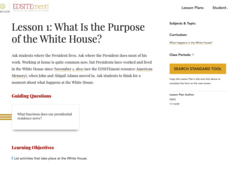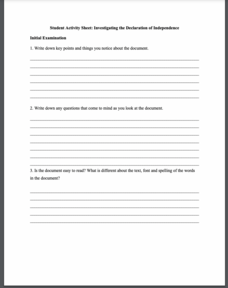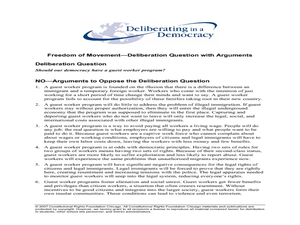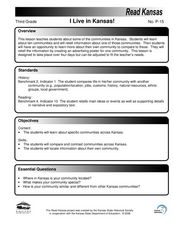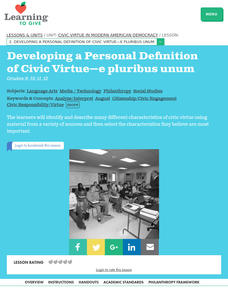National Endowment for the Humanities
Lesson 1: What Is the Purpose of the White House?
Pupils view images of presidents working and living at the White House. They list activities that take place at the White House and discuss the many purposes of the building.
Curated OER
Land Surveys
Students read and think about the relationship between maps and nature. They examine the origins of the Land Ordinance of 1785 and the large-scale topographical surveys that were commissioned a century later. They also read and analyze...
Curated OER
Erutan
Students discuss that governments exist for many purposes. They describe that governments maintain social order, provide public services, provide national security, manage conflict, establish justice, and manage resources.
Curated OER
Federalism and the Prevention of Abuse of Power in the US Federal Government
Fourth graders stud Federalism and identify examples of abuse of power.
Curated OER
History and Government of the United States
In this U.S. worksheet, students take notes in a graphic organizer as they read several passages, then answer four comprehension questions.
Curated OER
The Social and Economic Impact of Wildlife and Natural Resource Management
Students develop an understanding of environmental laws and regulations. In this research instructional activity, students utilize information that involves controversial issues of wildlife and society.
Roy Rosenzweig Center for History and New Media
Investigating the Declaration of Independence
Teach your class about the Declaration of Independence while giving them practice working as a team. The resource breaks participants into groups and has them answer questions about specific grievances from the Declaration of...
Bill of Rights Institute
Celebrate Constitution Day
September 17 is a great day to focus on the US Constitution for on this day in 1787, the Constitution was signed. Through a series of activities, high schoolers get a chance to look closely at this famous document and the rights and...
National Endowment for the Humanities
Ratifying the Constitution
Ratifying the Constitution was no simple task. Using primary sources, such as classic writings from the Federalists and Anti-Federalists, young scholars examine the arguments for and against the Constitution. They then decide: Would they...
Deliberating in a Democracy
Freedom of Movement
Class members examine human migration. For this population lesson, they read an article entitled, "Freedom of Movement" and respond to discussion questions about the article related to guest worker programs.
Chicago Botanic Garden
Impacts of Climate Change
Scholars become experts on the eight major impacts of climate change through a jigsaw and grand conversation. They then research and present what they learned about effects specific to their region.
Curated OER
The Constitution and the Right to Vote: Ch 6
The US Constitution dictates which members of society have the right to vote. After reading about amendments extending voting rights, your class answers these questions on the 15th, 14th, and 23rd amendments. Use as a quiz or to guide...
Center for Civic Education
What Does Returning to Fundamental Principles Mean?
Looking for materials for your Constitution Day and Citizenship Day lessons? Then check out this packet of activities that not only gets your class members thinking critically about the fundamental principles at the heart of American...
Curated OER
Measuring Citizenship
Twelfth graders explore citizenship. They discuss what makes a person a citizen of a country. Students examine the differences between resident aliens and naturalized citizens. They discuss the process for becoming a citizen and decide...
Curated OER
Alaska Purchase Debate
Students examine the benefits and the challenges Alaska has presented to the United States. They research what the government and the people of the United States considered at the time of the purchase of Alaska in order to debate the...
Curated OER
Immigration Policy: Past and Present
Students examine the history of the United States' immigration policy. They identify events in history that changed policies regarding immigrants. They discuss new possible legislation as well.
Curated OER
Fertilizers, Pesticides and Human Health
Students define several vocabulary terms related to chemicals and toxicology. Students calculate chemical concentrations in water and explain the toxicological principles that govern safety of substances. Students conduct an...
Curated OER
Dissidents Delicately Democratize
Young scholars read and discuss the article, 'Chinese Dissidents Issue a Sharp Challenge to the Government' on pro-democratic manifestos that were recently written in China, write a journal entry on what human rights means to them.
Curated OER
The Hunter Using Children's Literature to Teach the Geography of Africa
Students are able to answer basic questions about the region and the use of natural resources, sketch a mental map of the story's setting, and find their way through the thematic maze/map.
Curated OER
I Live in Kansas!
Student research and apply information about communities in Kansas. In this Kansas lesson plan, 3rd graders study ten communities in the state, complete a booklet, and compare the communities to their own. They use the information to...
Curated OER
Democracy Sense
Students define democracy and distinguish representative from direct or pure democracy. Then, with the focus on representative government, students will discuss and trace voting patterns in the United States.
Curated OER
Civic Virtue in Democracy
Students identify and describe characteristics of civic virtue. Following a class discussion, they create their own definitions of civic virtue. They write essays based on their own definitions and formulate conclusions on the state of...
Curated OER
Genetic Engineering of Crop Plants
Students explore genetic engineering and it biological and ethical implications. By conducting experiments with genetically engineered corn and plain corn they determine the difference in taste. Students also discover the effects of...
